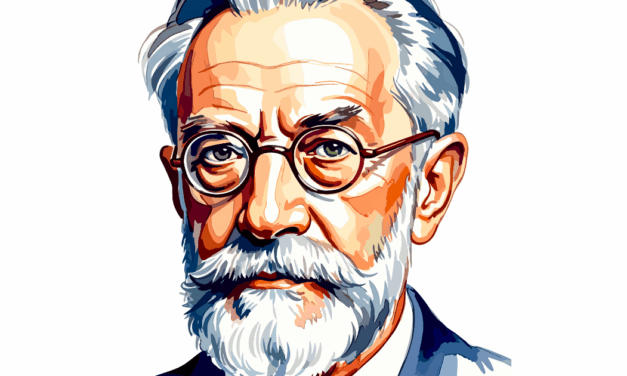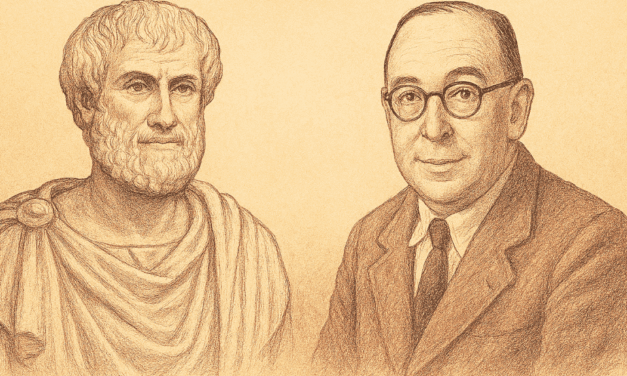This article first appeared in the Christian Research Journal, volume 46, number 1/2 (2023).
For further information or to support the Christian Research Journal please click here.
When you support the Journal, you join the team and help provide the resources at equip.org that minister to people worldwide. These resources include our ever-growing database of over 2,000 articles, as well as our free Postmodern Realities podcast.
Another way you can support our online articles is by leaving us a tip. A tip is just a small amount, like $3, $5, or $10, which is the cost of a latte, lunch out, or coffee drink. To leave a tip, click here
The church service at our suburban Cincinnati nondenominational church had barely ended when I started receiving text messages from friends. All of them shared some version of the same question my wife and I were asking each other about the sermon we had just heard delivered by a visiting preacher: “What in the world was that?”
The sermon was delivered by a man who, on the surface, was someone we could trust. He was a professor from a reputable Christian university, with master’s degrees in both divinity and New Testament studies, and a PhD in philosophy/New Testament exegesis. He had preached at our church on several occasions over the years. His sermons had never been very memorable. But this Sunday morning was different. He had more than biblical wisdom to deliver. He had an agenda.
Scripture Twisting. The message was based on Ephesians 2:11–22, a text that is sandwiched between Paul’s explanation of Christ’s person and mission at the beginning of chapter 2, and his clarification in chapter 3 that the gospel is also meant for the Gentiles. The unmistakable point of this passage is that the Law had been superseded by the grace we receive through Christ’s sacrifice. It is a call to unity. Paul was exhorting his readers to recognize that the Gentiles were no longer “foreigners and aliens,” but fellow members of God’s household. He was clarifying a theological point about the unifying nature of salvation and the shared solution to our human rebellion and hostility toward God.
Our guest preacher acknowledged all this in passing. But four minutes into it, things took an insidious turn. His focus subtly shifted from the solution for man’s hostility toward God to the reality of human beings’ hostility toward one another. Suddenly, we were hearing about diversity, inclusion, “minority status,” and the human inclination for conflict.
He had changed the subject. His goal had not been to exegete the passage in question; it had been to castigate the congregation.
Exegesis vs. Eisegesis. Once the subtle change of subject morphed into the central point, we were treated to a lecture about the lack of diversity in the demographics of suburban Midwestern community churches like ours and warned about “Christian Nationalism.” These topics were lead-ins to share with us letters he had received from his diverse list of friends in response to a query he had offered them: “What do you want white American Christians to understand about Christians like you?”
The specter of division is built right into his question. And it didn’t take long for it to bear fruit. From those letters we learned that “it’s not enough for white Christians to be ‘non-racist,’ we need them to be ‘anti-racist,’’’ and that “we need white brothers and sisters to not only acknowledge their own racist tendencies but to also confront and challenge the racism of family, friends, co-workers, and church folk.” We were called on to “reimagine and reinvent systems that make it more difficult for African Americans to realize the American dream.” And we were “comforted” in learning that a woman who had never met a single person in our church family had assured us, “I do not hate you. I just pray that one day I will be able to wholeheartedly forgive you.”
Forgive whom for what, exactly? It isn’t hard to imagine the damage this thirty-minute cultural hand grenade caused when it detonated inside our church.
In the end, our visitor wasn’t exegeting meaning or an application from the biblical text. He was imposing his own cultural view on Scripture. His focus was on racism, an obvious sin, a historical blight on society, and something we all need to talk about. But making generalized assumptions about the actions and attitudes of entire groups of people we don’t know and segregating “white Christians” from “Christians of color” are not acceptable alternatives for seeing every human being through the biblical lens that tells us we are all made in the image of God. How does someone who starts with those kinds of credentials end up in a place like this?
The Lens of Self. The method this man used to address his topic is a microcosm of a trend that is metastasizing inside the church. Our congregation saw it in real-time. But the more dangerous kind of eisegesis happens slowly and insidiously. It thrives on the human tendency to invert the objective Scriptural standard by which we are meant to interpret culture. Instead, we have been lured into interpreting Scripture through a lens that has been hideously warped by culture. And it is in no way limited to racial issues. This thing we call “wokeness” is an equal-opportunity acid that corrodes every aspect of what it means to think “Christianly.”
The tentacles of this kind of thinking are slithering into our churches through a redefinition of social justice, equity, inclusivity, tolerance, and love. But the head of the hydra is the same as it has always been — the notoriously self-focused human propensity to see the world through the toxically relativistic standard of our personal “lived experience.”
In his book, The Rise and Triumph of the Modern Self, Carl Trueman chronicles the twisted way we have moved the locus of our sense of self from the transcendent to the immanent. Though Trueman focuses primarily on how this has affected sexual identity, the historical framework he uncovers applies to every aspect of this self-focused agenda.
One of Christianity’s earliest thinkers, Augustine of Hippo (AD 354–430), saw himself as naturally wicked in comparison to his Maker. But by the eighteenth century, Jean-Jacques Rousseau had turned Augustine’s analysis upside down. To Rousseau, “natural man” was essentially good. It was the external forces generated by society that had corrupted him. Rousseau’s thinking is still with us. We see it reflected in the postmodern notion that an individual is at his best when he acts in accordance with his fundamental nature. Amour propre, Rousseau called it, “self-love.” Trueman explains, in “Rousseau’s emphasis on self-love….we can see emerging the basic outlines of modern expressive individualism. The real identity of an individual is to be found in the inner psychological autobiography.” But “society and its conventions” prevent the expression of “the real, authentic self.”1
Sexualizing Psychology. Rousseau framed the picture. The Romantics filled it in. It is hard to imagine a poet having much influence on our contemporary culture, but William Wordsworth, Percy Shelley, and William Blake were the media stars of their day. They made ideas like Rousseau’s palatable to people by promoting a sentimental and empathetic view of ethics. Trueman contends that the Romantics’ assault on the transcendent included attacks on institutions like traditional marriage and the family because they saw them as representative of oppressive societal norms that had corrupted “natural man.”2 Sigmund Freud took it one step further. “The genius of Freud, like that of [Charles] Darwin, lay in his ability to articulate…a scientific idiom that carries rhetorical power in this modern age.”3 Whether true or not, “Freud provided a compelling rationale for putting sex and sexual expression at the center of human existence.”
Freud was successful at linking the science of the Enlightenment with human sexuality. He enlisted Rousseau’s views into a perspective that is at the core of what has become culture’s obsession with sexual identity. Freud and those who followed him promoted the modern notion of “scientific reason as the means by which human beings can be reconciled to civilization in a way that avoids the burdens of guilt and anxiety [brought on by] religion.”5 He sold the myth that sexual desire and fulfillment are the keys to what it means to be human. In doing so, he helped legitimize a cultural ecosystem in which personal identity — and anything adjacent to it — could be politicized.
Politicizing Everything. Trueman condenses the philosophical chain of events that led us here: “To follow Rousseau is to make identity psychological. To follow Freud is to make psychology, and thus identity, sexual. To mesh this combination with [Karl] Marx is to make identity — and therefore sex — political.”6
Wilhelm Reich and Herbert Marcuse were two Freud disciples who led the charge in academia to link sexuality to politics. But their project was about much more than sexuality. Reich and Marcuse were just two of a cadre of Marxist intellectuals who were developing Critical Theory, a social theory that took Marxist economic assumptions and applied them to every kind of social structure. Suddenly, psychology was identity, identity was political, and Marxism was the glue that held it all together.
Where Marx focused on the economic oppression of the proletariat, critical theorists took it further. They concluded that all of history has been defined by a struggle between oppressed and oppressor groups. Modern critical theorists are applying the same model to LGBTQ, racial, and women’s issues to make everything political. As Natasha Crain so eloquently explains: “From this perspective, all relationships between people are ultimately understood to be functions of group power dynamics. Those in power — the oppressors — want to keep their power, so they will work to maintain the oppressive societal structures that gave them their power…. [O]ppressors who are enlightened enough to recognize their role in oppression must set aside their privilege to help free the oppressed” (emphasis added).7
To be “woke” is to identify as one of the “enlightened oppressors” — a morally virtuous lecturer who can rise above it all and set the oppressed free by castigating the oppressors for their “ignorance.” It is the self-righteous mindset that lies behind the practice of injecting a toxic, anti-biblical message into the unsuspecting sheep. It is culturally driven. It is eisegesis on steroids. And it is exactly the method our visiting preacher used to make his case.
Knowing the history behind Critical Theory exposes its anti-biblical roots. But once one has accepted this self-focused model of political oppression, it makes perfect sense to legitimize it using the same kind of self-focused standards. Hence, our guest preacher’s repeated exhortation to accept his critique because it was substantiated by the “lived experiences” of his letter-writing friends. If they lived it, who were we to question it?
The logical flaw in using the lived experiences of some people to judge the character and motivations of entire people groups should be obvious. What about those whose lived experiences are just the opposite? They can write letters, too. But we don’t hear from them because their input doesn’t fit the narrative. What’s worse is that one must not simply ignore them. Inside the woke mentality, you are free to vilify them for taking sides with the “oppressors.”
This is not to deny the clear fact that some Christians have engaged in real instances of racism or other forms of sinful abuse of their fellow human beings. We have seen the ramifications of that throughout church history. It’s undeniable. But the subjective experiences of some are not a valid way to arrive at an objective standard by which we can judge anyone’s character.
Beware the Safe Space. Unlike the full-frontal assault our congregation faced, there is a more common approach to these ideas playing out all around us. It is subtle. And that’s what makes it so dangerous. Alisa Childers, former contemporary Christian music recording artist and now Christian apologist, with her podcast guests recently exposed the presentation of these same ideas stealthily baked into a wildly popular churchwide youth curriculum.8 They pointed out the psychology-based, self-focused nature of the content wherein Scripture memory verses were reworded to turn a psalm about God into a thought about “me,” for instance. Where lowering the paralytic through the roof (Mark 2) becomes a lesson about “having good friends.” Or, where Jesus’ purpose on this earth becomes to “[disrupt the system] in a culture that was struggling with political unrest, racial division, and religious abuse.”9 This curriculum does exactly what our visiting preacher did. It takes cultural ideas and shoehorns them into biblical passages, whether that’s what the author meant to do when he wrote them or not.
And then there are Christian colleges, ostensibly providing a safer environment than secular schools. Parents and students assume the faculty and staff at a Christian school think biblically. But the fences around Christian colleges don’t keep out bad ideas. Remember, our visiting preacher had been a professor at one for nearly three decades. How many young minds had been influenced by his eisegetical methods during that time?
Maybe those who engage these issues in these ways are doing so with pure motives. Maybe they’re simply mistaken. We can be charitable and allow that possibility. But that doesn’t mean we have to be passive when it happens. Beware the wolves in sheep’s clothing. They’re not going away. And they’re finding new ways to sneak into the pen.
Bob Perry, MA (Christian Apologetics) Biola University, is a speaker, teacher, writer, and retired aviator. He blogs at truehorizon.org.
NOTES
- Carl R. Trueman, The Rise and Triumph of the Modern Self: Cultural Amnesia, Expressive Individualism, and the Road to Sexual Revolution (Wheaton, IL: Crossway, 2020), 129.
- See Trueman, Rise and Triumph, 148–58, 202.
- Trueman, Rise and Triumph, 202.
- Trueman, Rise and Triumph, 204.
- Trueman, Rise and Triumph, 216.
- Trueman, Rise and Triumph, 250.
- Natasha Crain, Faithfully Different (Eugene, OR: Harvest House, 2022), 197–98.
- “When a National Kid’s Ministry Starts Promoting Progressive Ideas,” Alisa Childers Podcast, YouTube, March 8, 2022, https://www.youtube.com/watch?v=UeQdTMbAQYA.
- “Orange 2022 Conference Theme: Are You Ready to Be Human Again?,” Orange, https://orangetour.org/2022-theme/.








